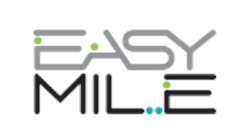- One word to describe yourself: Energetic
- Alma Mater: University of the West of England, Bristol, UK
- Favorite hobby(s): Training and competing in triathlons
- Fun fact about yourself: I once starred on the ‘hit’ UK show “First Great Western: The Railway.”
- Favorite station or stop that you have ever visited or frequent (and why): London Paddington Railway Station has to be not only one of the most beautiful stations I have ever visited, but having the honor to be the Duty Station Manager there makes it a very special for me.
Joseph Holmes’ career path began across the Atlantic and within a segment of transportation – rail – that goes back centuries. His career has led him to the U.S. and to the rapidly developing autonomous vehicle side of the business. The bridge between the two is Holmes’ dedication and focus on providing access to mobility.
Holmes serves as director of sales for North America for EasyMile where he is responsible for driving sales activity and increasing the number of active deployments in North America. Since joining EasyMile, he has led the business to grow by more than 200 percent. His colleagues explain this feat requires more than traditional sales skills, including a way to help the industry understand driverless technology’s potential within an existing business model.
Prior to working at EasyMile, he worked at First Group for more than 10 years in the UK and United States. He started at the Reading railroad station in various customer-facing roles before being accepted into First Group’s Operations Management graduate program and then moving to the company’s Strategy and Innovation Team. Here, he aided clients in understanding AVs and their impacts on emerging trends, such as on-demand transportation and mobile ticketing. In this role, Holmes worked with new technology providers, like Swiftly, Bishop Peak and EasyMile, to successfully integrate new technologies into existing operations. One of the highlights of his time working on the innovation team was working with Uber and Lyft in Portland and Boston, respectively, to help these cities have ADA compliant wheelchair trips on their respective platforms.
Holmes is described as a fierce advocate for “mobility for all,” and has been a leader in ensuring that EasyMile’s driverless shuttles have become ADA compliant. Additionally, once NHTSA required EasyMile to add seatbelts to its shuttles, Holmes worked closely with the engineering team to find and deploy a cost-effective, yet safe solution.
Is there a specific experience that led you to where you are today?
I started my ‘journey’ within passenger transportation back in 2005 at Reading railroad station in the UK. Here, I worked a variety of customer-facing roles that ranged from helping customers onto trains with their luggage, assisting wheelchair users and working with revenue protection checking passengers' tickets to ensure that they had the correct fare for their journey.
The energy that was present in a bustling environment was electric. From that point I knew I wanted to remain in the passenger transportation sector. Being able to transition that to working in shared mobility with EasyMile today is a dream come true!
What do you enjoy most about your job?
I love being part of a small yet highly innovative link in the large chain that is getting people from A to B. Automated vehicles could change urban life on myriad levels. The obvious benefit is environmental – electric vehicles will reduce emissions, more so if, as predicted, people switch to communal use rather than individual ownership.
But emission control is just the start. Something about cars that we rarely think about is that they spend very little of their time on the road. Overall, private cars are used less than 10 percent of time, sitting in a parking space or garage for the rest of it. Even a sidewalk moves more people per hour on average than a car lane!
Imagine not needing to own your own car because you could call in a communal driverless vehicle any time you wanted; residences would suddenly have less need for garages and car ports and that space could be reclaimed as liveable space.
Expanding on the point, cities, in general, could benefit from a reallocation of land previously set aside for car parks.
The Transportation Research Institute at the University of Toronto has estimated up to 87 percent of parking space could be freed up. A simple switch to convert these areas to green space could have even greater impact on sustainability. What’s more, with automated vehicles able to travel more closely together, the size of road lanes can be reduced, allowing for more pavement area or cycle lanes.
Essentially, the focus in cities could shift dramatically from the needs of its transport to the needs of its people, whose mental health would also receive a boost. You would no longer have to concentrate on the road when travelling – you could read, watch TV, sneak in some work before you get to the office or just nap.
And that is exactly why I believe EasyMile’s projects are so vital. We’re on the cusp of a transport revolution and these projects provide the opportunity for the community to be part of the journey and the learning process. To see the benefits and see the future.
What’s the most challenging part of your job?
All our clients have different goals and ambitions for automated technology. The most challenging (and rewarding) part is bringing these goals and ambitions to reality. Seeing the vehicles arrive on site, and having the first passengers ride the vehicle, or in the case of our material handlings vehicle, having the first goods transported, is a beyond satisfying feeling!
Accomplishment you’re most proud of and why?
Providing solutions to any transportation challenge is something to be proud of! Each and every one of EasyMile’s deployments have their reasons to be on the ground, and seeing that come to fruition is something that fills me with pride!
The first project launch back in 2017, just as I joined EasyMile certainly was a very proud moment in my career. This project with the Minnesota Department of Transportation, saw our EZ10s being tested in winter conditions and was a project I worked on whilst I was at First Transit - securing the operations piece. To be able to carry that through, and pivot from representing the projects transport operator to the vehicle solutions provider, was a very proud moment for me.




